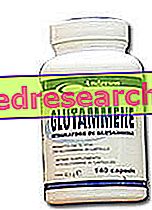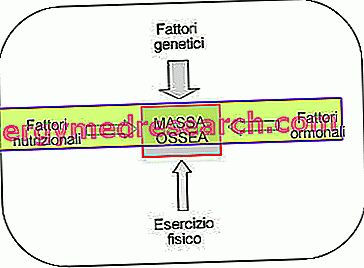
Information on Glutammene - Andersonn
Glutammene - Anderson
Food supplement based on L-Glutamine
FORMAT
Bottle of 140 capsules
COMPOSITION
l-glutamine
Gelatin
One capsule contains: L-Glutamine: 500 mg
Product features Glutammene - Andersonn

The biological role of glutamine seems quite complex, given that it is part of multiple metabolic and functional pathways, which ensure the correct functioning of the various apparatuses.
Among the various functions we can remember:
- The detoxifying action from ammonia: glutamine is the most efficient carrier of amino groups. Originating at the level of the various extrahepatic tissues, it reaches the liver, where it gives up its ammonium ion which will then be eliminated in the form of urea;
- Anabolic role: glutamine is part of the protein synthesis processes, like all other amino acids;
- Energetic role: glutamine is a precursor of glutamate and alfachetoglutarate, thus falling both in the krebs cycle and in the gluconeogenic process;
- Proliferative role: it represents one of the main energy sources for cells in active proliferation, such as those of the intestinal mucosa or the immune ones;
- Excitatory role: crossing the blood-brain barrier, it reaches the neuronal level, where it is converted into glutamate, a neurotransmitter with an excitatory function;
- Antioxidant role: providing glutamate, used in the synthesis of glutathione.
Given its multiple roles, glutamine supplementation is used in the therapeutic field in the treatment of post-traumatic and infectious situations, and in some chronic and metabolic pathologies, with the aim of reducing mortality and morbidity, even if not all scientists seem to agree on the benefits induced by the administration of this amino acid.
Potential benefits for sports use Glutammene - Andersonn
In sports, this supplement is widely used, with different purposes
- Facilitate recovery;
- Improve athletic performance in terms of endurance and strength;
- Increase the lean mass;
- Reduce the catabolic effects of intense training;
- Increase GH secretion;
Rationalization of integration into the practice of sports Glutammene - Andersonn
Despite the widespread use of this amino acid in sports, and the numerous benefits expected by the various athletes, the scientific literature seems to be quite critical of sports supplementation. Several studies, in fact, seem to agree on the absence of ergogenic and partition effects in healthy individuals subjected to training, while interesting ideas come from the action of glutamine on the immune system.
The intense training causes a decrease in the immune defenses, exposing the athlete to various infectious risks, which naturally can compromise the state of health and subsequent performance. The lowering of glutamine levels is a wake-up call for this condition, also known as overtraining syndrome, for which the trial has given encouraging successes, supporting the immune defenses of the athletes (reduction of apoptosis of neutrophils, increase in levels of h lymphocytes and saving the body from further oxidative stress.
Recommended use by the company - Glutammene - Andersonn
It is advisable to take one serving a day during a meal. One dose = 3 capsules (1.5 grams of glutamine).
Use in sports Glutammene - Andersonn
The various studies are rather far from defining an optimal dosage, especially for sports integration. Taking inspiration from the various scientific articles published, and not from common practice, in which dosages are described even higher than 20 g / day, the most characterized and studied range ranges from 3 to 8 grams per day.
The intake should be preferred on a full stomach, so as to improve intestinal transport, which occurs through simple and sodium-facilitated diffusion mechanisms. It should also be remembered that glutamine is a very important energy source for the intestinal cell, which by consuming it will significantly reduce its bioavailability.
It would also be preferable to take pre-workout, in order to prevent the glutamine fall that occurs after exercise, even if there is evidence that it is more effective after training, along with a glucose source, in restoring stocks of muscle glycogen.
How to optimize your business - Glutammene - Andersonn
From the various studies emerges as the association of
Glutamine + BCAA + Protein causes an increase in lean mass after weeks of integration and heavy exercise;
Glutamine + carbohydrates, taken in the post-work-out anabolic window, can facilitate glucose uptake and glycogen resynthesis; taken before intermittent training, they seem to improve athletic performance and reduce the feeling of fatigue.
Glutamine + creatine + ribose, does not seem to provide particular benefits in terms of body composition variation.
Glutammene side effects - Andersonn
Several studies have experimented supplementation with doses of oral glutamine even greater than 20 grams, without registering any particular side effect.
A single long-term study, with athletes taking doses of 28 grams per day for 2 weeks, distributed in 4 different assumptions, showed no side effects.
Precautions for use Glutammene - Andersonn
The product is contraindicated in cases of renal or hepatic disease, cardiovascular disease and / or hypertension, during pregnancy, during lactation, under 12 years and in adolescents not yet trained.
In the event of prolonged use (over 6/8 weeks), medical advice is required.
This article, elaborated on the critical re-reading of scientific articles, university texts and common practice, is for informational purposes only and is therefore not a medical prescription. It is therefore always necessary to consult your doctor, nutritionist or pharmacist before starting to use any kind of supplement . Further information on the critical analysis of Glutammene - Andersonn.
| BIBLIOGRAPHY |
Regul Toxicol Pharmacol. 2008 Apr; 50 (3): 376-99. Epub 2008 Jan 26. Risk assessment for the amino acids taurine, L-glutamine and L-arginine.Shao A, Hathcock JN. Clinical use of glutamine supplementation. Wernerman J. J Nutr. 2008 Oct; 138 (10): 2040S-2044S. Review. L-glutamine supplementation induces insulin resistance in adipose tissue and imprints insulin signing in the liver and muscle of rats with diet-induced obesity. Prada PO, Hirabara SM, de Souza CT, Schenka AA, Zecchin HG, Vassal J, Velloso LA, Carneiro E, Carvalheira JB, Curi R, Saad MJ. Diabetologia. 2007 Sep; 50 (9): 1949-59. Epub 2007 Jun 29. Effect of physical activity on glutamine metabolism. Agostini F, Biolo G. Curr Opin Clin Clin Metab Care. 2010 Jan; 13 (1): 58-64. Review. Peptide glutamine supplementation for soccer players. Favano A, Santos-Silva PR, Nakano EY, Pedrinelli A, Hernandez AJ, Greve JM. Clinics (Sao Paulo). 2008 Feb; 63 (1): 27-32. Glutamine supplementation prevents exercise-induced neutrophil apoptosis and reduces p38 MAPK and JNK phosphorylation and p53 and caspase 3 expression. Lagranha CJ, Hirabara SM, Curi R, Pithon-Curi TC. Cell Biochem Funct. 2007 Sep-Oct; 25 (5): 563-9. Impact of glutamine supplementation on glucose homeostasis during and after exercise. Iwashita S, Williams P, Jabbour K, Ueda T, Kobayashi H, Baier S, Flakoll PJ. J Appl Physiol. 2005 Nov; 99 (5): 1858-65. Epub 2005 Jul 21. Effects of effervescent creatine, ribose, and glutamine supplementation on muscular strength, muscular endurance, and body composition. Falk DJ, Heelan KA, Thyfault JP, Koch AJ. J Strength Cond Res. 2003 Nov; 17 (4): 810-6. Nutrition. 1997 Jul-Aug; 13 (7-8): 738-42. The effects of oral glutamine supplementation on athletes after prolonged, exhaustive exercise. Castell LM, Newsholme EA. Lack of functional benefit with glutamine versus placebo in Duchenne muscular dystrophy: a randomized crossover trial. Mok E, Letellier G, Cuisset JM, Denjean A, Gottrand F, Alberti C, Hankard R. PLoS One. 2009; 4 (5): e5448. Epub 2009 May 6 Glutamine protects against increases in blood ammonia in football players in an exercise intensity-dependent way. Bassini-Cameron A, Monteiro A, Gomes A, Werneck-de-Castro JP, Cameron L. Br J Sports Med. 2008 Apr; 42 (4): 260-6. Epub 2007 Nov 5. Effect of glutamine supplementation combined with resistance training in young adults. Candow DG, Chilibeck PD, Burke DG, Davison KS, Smith-Palmer T. Eur J Appl Physiol. 2001 Dec; 86 (2): 142-9. Cell Biochem Funct. 2010 Jan; 28 (1): 24-30. Cruzat VF, Rogero MM, Tirapegui J. L-glutamine supplementation induces insulin resistance in adipose tissue and imprints insulin signing in the liver and muscle of rats with diet-induced obesity. Prada PO, Hirabara SM, de Souza CT, Schenka AA, Zecchin HG, Vassal J, Velloso LA, Carneiro E, Carvalheira JB, Curi R, Saad MJ. Diabetologia. 2007 Sep; 50 (9): 1949-59. Epub 2007 Jun 29. Am J Physiol Cell Physiol. 2001 Oct; 281 (4): C1259-65. Effect of glutamine supplementation on exercise-induced changes in lymphocyte function.Krzywkowski K, Petersen EW, Ostrowski K, Kristensen JH, Boza J, Pedersen BK. Examination of the efficacy of acute L-alanyl-L-glutamine ingestion during hydration stress in endurance exercise. Hoffman JR, Ratamess NA, Kang J, Rashti SL, Kelly N, Gonzalez AM, Stec M, Anderson S, Bailey BL, Yamamoto LM, Hom LL, Kupchak BR, Faigenbaum AD, Maresh CM. J Int Soc Sports Nutr. 2010 Feb 3; 7: 8. J Strength Cond Res. 2006 Aug; 20 (3): 643-53. Kerksick CM, Rasmussen CJ, Lancaster SL, Magu B, Smith P, Melton C, Greenwood M, Almada AL, Earnest CP, Kreider RB. Appl Physiol Nutr Metab. 2006 Oct; 31 (5): 518-29. Addition of glutamine to essential amino acids and carbohydratesWilkinson SB, Kim PL, Armstrong D, Phillips SM. |



